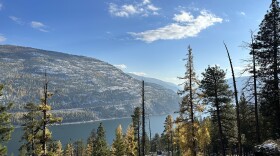-
State utility regulators have rejected part of a petition to consider climate change in their decision-making; State regulators deny petition to for higher selenium standard in Lake Koocanusa; A Missoula homeless shelter closed last week as pandemic funding ends.
-
Lincoln County officials are asking state regulators to adopt a less restrictive pollution rule for selenium in Lake Koocanusa. The current standard has been controversial on both sides of the Canada-U.S. border, but multiple attempts to roll it back have failed.
-
The Montana Department of Justice is blocking access to what it calls privileged documents showing its communication with a Canadian mining company. An environmental group is now suing to access the information.
-
A new report says a Canadian company that runs coal mines north of Montana hasn’t set enough money aside for cleanup. Those mines are sending pollution into Montana waters.
-
After years of tribes calling on the U.S. and Canada to do something about selenium pollution flowing into Montana, the two governments have struck a deal. An international body will make recommendations on how to settle the boundary-water dispute.
-
The U.S. and Canada have struck a deal over pollution flowing from British Columbia coal mines into a lake and river system in Montana.
-
A new study finds that Canadian coal mines contribute nearly all of the selenium found in Lake Koocanusa. For decades, coal mines along British Columbia’s Elk River have sent large amounts of selenium into Lake Koocanusa in northwest Montana.
-
Federal officials from the U.S. and Canada plan to meet with Montana and British Columbia tribes over coal mining pollution. Selenium has for years flowed from B.C. coal mines into the transboundary Lake Koocanusa.
-
Conservation groups filed lawsuits Thursday challenging a state board’s assertion that it overturned a pollution standard for Lake Koocanusa.
-
President Joe Biden and Canadian Prime Minister Justin Trudeau have announced a forthcoming deal to “reduce and mitigate” the impact of pollution flowing into Montana and Idaho from Canadian coal mines.
Play Live Radio
Next Up:
0:00
0:00
Available On Air Stations







